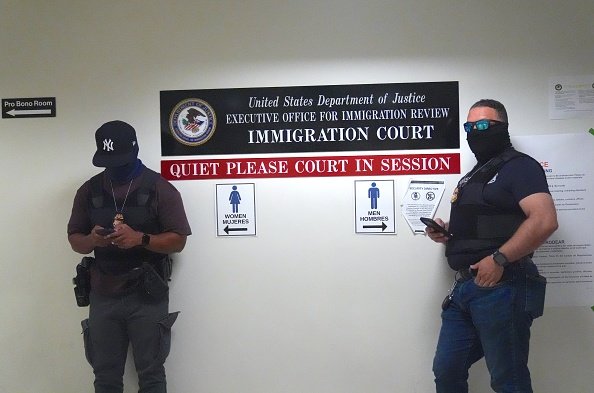Immigration Law
Trump administration fires immigration judges, even as it seeks to hire more of them

Masked Immigration and Customs Enforcement agents were seen stalking the corridors on the 12th floor of Lower Manhattan’s immigration court at 26 Federal Plaza in New York City on Sept. 8, 2025. (Photo by Selcuk Acar/Anadolu via Getty Images)
The Trump administration fired nearly 20 immigration judges this month, following the dismissal of more than 80 judges earlier this year.
The dismissals come as the administration is seeking to add immigration judges by filling jobs with up to 600 military attorneys. The current backlog in the courts is nearly 4 million cases, NPR reports in its article on the latest firings.
Matt Biggs, the president of the union that represents immigration judges, said in a statement to NPR the dismissal of more judges “is an illogical and costly setback for the nation’s immigration courts.”
“At a time when the backlog has reached historic levels and the administration has made immigration enforcement a central issue, the removal of experienced judges is hypocritical, undermines the law, wastes taxpayer dollars and further delays justice for citizens and immigrants alike,” said Biggs, who is the president of the International Federation of Professional and Technical Engineers.
The number of departing immigration judges swells when the dismissals are combined with voluntary resignations. The loss was more than 125 immigration judges in the last nine months, down from 700 judges at the start of the year, according to NPR.
In San Francisco, seven immigration judges have been fired as of Sept. 11, amounting to about one-third of the judges there, the San Francisco Chronicle reports.
Immigration judges preside in courts overseen by the Department of Justice’s Executive Office for Immigration Review. They decide whether noncitizens accused of violating immigration laws should be removed or granted protection from removal.
San Francisco immigration courts grant relief to immigrants in 71% of the cases, one of the highest rates among the nation’s largest courts, the article says.
Five of the seven judges fired in San Francisco grant relief at higher rates than their colleagues. One fired judge had the lowest rate of granting relief in the court.
Sirce Owen, the acting director of the Executive Office for Immigration Review, said in an August memo “statistically improbable outcome metrics” could indicate bias or failure to adhere to the law, warranting “close examination and potential action.”
Executive Office for Immigration Review leadership has also criticized judges for failing to manage their caseloads efficiently, according to NPR.
Write a letter to the editor, share a story tip or update, or report an error.

